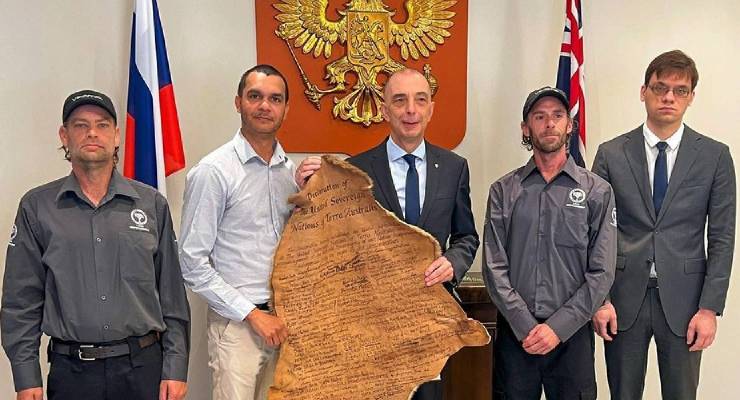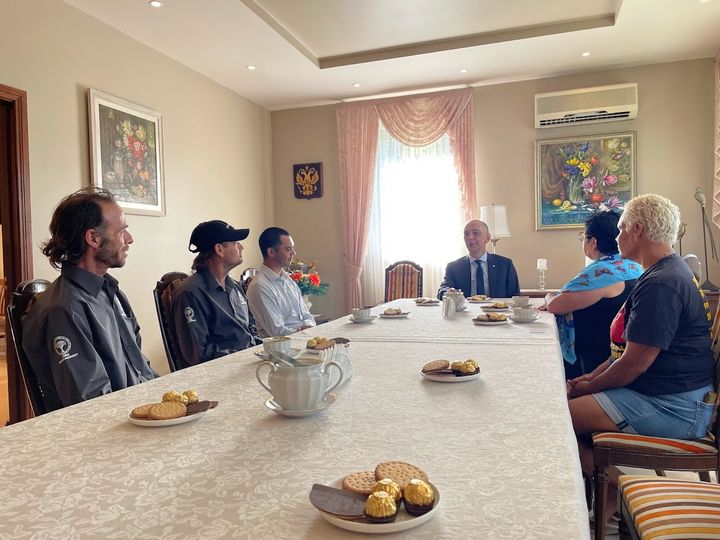
Members of an obscure Indigenous sovereign citizen group have met with Russian officials in Australia, claiming they discussed establishing “diplomatic relations” and giving support to Russia’s invasion of Ukraine.
On Saturday, Bruce “Buddy” Shillingsworth of the United Sovereign Nations of Terra Australis group met with Russian Consul-General Igor Arzhaev and other Russian diplomats at the consulate in Sydney. The Facebook page for the Russian consulate in Sydney posted a photograph of the meeting. The photo’s caption was translated by Facebook from Russian into English.
“March 18, the Consul-General of Russia in Sydney IN Arzhaev met with representatives of the Indigenous people of Australia. The event was held in a friendly and welcoming atmosphere,” it read.

But Shillingsworth claims the meeting went further than that. On Instagram, he posted a picture of himself and Arzhaev posing with a kangaroo skin inked with his group’s declaration of sovereignty.
“Yaama, Today A Landmark Moment At The Russian Consulate To Sit And Discuss Diplomatic Relations. #HouseOfLore Lore Enforcement”, the post’s caption read.
Shillingsworth’s group is an anti-vaccine, conspiracy-fuelled group associated with the anti-government freedom movement, which has been accused of “blackfishing” the Indigenous sovereignty movement in Australia. The group was involved in the 2021 fire at Old Parliament House. Shillingsworth was present and was charged with abetting arson.
The Russian consulate did not respond to emails or answer the phone for further information about the meeting. Shillingworth directed Crikey to an article written in Russia’s news agency EurAsia Daily (an outlet that has been called “a worker bee in the Kremlin’s information war”).
Crikey was unable to find the article online, but a mirrored copy of it hosted by oopstop.com wrote that Shillingsworth’s delegation “expressed support for a special operation to denazify Ukraine”.
The article includes a statement reportedly given by Shillingworth and his group:
“We, the Indigenous peoples, hereby declare to the Russian people that we oppose the transfer of Australian weapons, troops and assets by the government to Ukraine. The Australian prime minister has already sent $700 million worth of weapons to Ukraine, paid for by Australian taxpayers. On top of that, the government wants to spend $368 billion on submarines at obscenely high prices. We tribes disagree!
“As the traditional custodians of this land, we have not given permission to send weapons, troops and money to a war that does not involve Australia. As a sovereign people, we express our solidarity with the Russian-speaking peoples of Donbass, who are the indigenous inhabitants of the land on which they are fighting, and who are denied the right to self-determination, the right to even speak their native language, and have been terrorised by the illegal neo-Nazi regime in Kyiv for eight years without a single word of condemnation from the Australian government. We bring peace and friendship to the Russian people. We implore the Australian government to engage in diplomacy and stop sending money and weapons to Ukraine.”
Australian National University College of Law Associate Professor Ron Levy acknowledged that a country conducting a diplomatic meeting with a group claiming sovereignty could be the first step towards broader international recognition of sovereignty status. However, in this case it was extremely unlikely, he said.
“I don’t think that this would count. There is only a very, very preliminary move and there isn’t a broad movement around the world to match it,” he said.
He said Russia’s influence in diplomatic relations had been undercut by their invasion: “In the context of Ukraine, Russia is on the outs with the international community. There’s an overwhelming vote to condemn them.”
Levy said that international recognition of sovereignty is heavily influenced by domestic recognition, pointing to the Voice to Parliament referendum as one potential step.








Did the irony not occur to this dingbat, that while proclaiming the inhabitants of the Donbass as “indigenous” (is that including Putin’s “Little Green Men” who kicked this whole thing off), he blithely ignores the “indigenous” inhabitants of Ukraine who are being invaded by an equivalent of the British invaders of Australia……………….
I guess rational thought is a big ask if you couldn’t find your arse in the dark.
The indigenous people of Crimea were Tatars but after Potemkin took control for Catherine the Great from the Turks he populated it with Russians. That population is now 80% ethnic Russian. It was never part of Ukraine historically until Russia ceded administration to the Socialist Soviet Republic of The Ukraine ( an integral part of the then Russian empire.)
Should read Tartars
Every man and his dog has had it in for the Tatars……………….
………..probably the biggest forced deportation was courtesy of Stalin when some 250k were deported to Uzbekhistan.
Krushchev formally transferred Crimea to Ukraine in the 1950’s (supposedly for “administrative” reasons).
Tatars have been drifting back into Crimea since 1967, but increasingly in the 80’s and 90’s.
Then Putin continued the trend in 2014.
https://www.wilsoncenter.org/blog-post/crimean-tatars-and-russification
Exactly. Crimea was made part of Ukraine and that is the border recognised by the UN. So it is part of Ukraine. Once you give something away it does not belong to you and you have no right to demand its return and still less right to seize it by violence without authority. This excuse for the annexation of Crimea is just crude Russian propaganda.
Looney insignificant’s.
The Russian representative “met with representatives of the Indigenous people of Australia.” Who and how many indigenous people to these lovely people actually represent???
Excellent question that should be asked far more often in many other contexts too. Far better to assume that anyone is only speaking for themselves except when there is solid independent evidence that they also speak for some others, and to ignore any claims of being representative that lack such evidence. The media is plagued with all sorts of self-appointed representatives who have no legitimacy and are just charlatans.
Especially when there is not much new in this world but repackaged, rebranded and relaunched old ideology and tropes; most of the public facing individuals would have no idea.
Accordingly, like the influence of the Jesuits, such group members are not aware of the real influencers and puppeteers due to secretive nature; Scientology is a good example of similar cult behaviour.
How low and desperate have the Russians sunk that they would have their ambassador meet with such a fringe group who seem barely capable of representing themselves?
Sorry my bad, not so low, was just their Consul-General. The ambassador is for higher things, like being chopped up by Sarah Ferguson on 7.30.
Was going to ask the same question, but like many articles in the media which simply ‘report’ but no analysis when the ‘how & why’.
The latter is not interrogated maybe the need to respect authority in Oz e.g. who are they, where do they come from, specifics on who influences them, with whom do they hang out and the big one, not funding, but their ideological influence of the past, ‘follow the words’?
Given the number of indigenous nations that were violently subsumed into the Russian empire in their eastern push, I’m surprised the Russian embassy would touch this … but then again, they count on people being ignorant of Russian imperial history.
Not just subsumed, what happened to the Circassians was an early version of modern genocide. https://en.wikipedia.org/wiki/Circassian_genocide
Apparently attacking another country, destroying their livelihood and arbitrarily killing its citizens is now OK – at least according to these yobbos.
It was wrong two hundred years ago and is still wrong today. I really wonder about the basis on which this group declares itself representative of all indigenous Australians. Not to mention the Jewish-descended president of the Ukraine being described as a neo-Nazi.